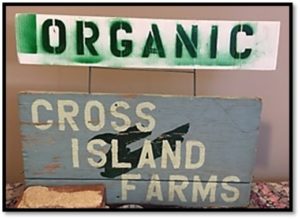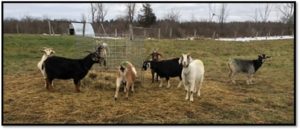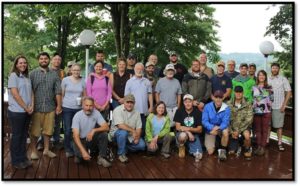Trading Boots: a Veteran’s Transition into Agriculture
Samuel Palmer works at Cross Island Farms to gain experience for his budding new career: farmer.
by Alyssa Couse
Jefferson County, NY is home to two prominent ways of life: agriculture and the military. The proximity of Fort Drum to local farms and agribusinesses creates an opportunity for the two worlds to collide. As different as these lifestyles seem, there are actually many glaring similarities. Each requires dedicated, responsible, compassionate, hardworking people who have the ability to wear multiple hats. Technology is being incorporated more and more into each industry, thus creating more opportunities in information technology and engineering.
As farms expand with more animals and employees, management skills are required to keep the operations moving efficiently. Soldiers with experience in diesel mechanics could apply their skills to farm equipment and hauling trucks. These are just a few examples of how the agricultural industry is in need of a workforce that is remarkably compatible with the skills of the military service men and woman who are transitioning into civilian life.
Through the Cornell Small Farms Program, whose mission states “We help farmers get expert assistance to facilitate all phases of small farm business development, from initial growth to optimization to maturity,” the Farm Ops program was born. This effort brings resources to veterans who want to enter the agriculture industry. From starting their own small farm, to working for a local farm or agribusiness, veterans have access to a statewide network. Online courses, business planning resources, workshops, and on-the-job training opportunities are available to guide veterans in their transition from military to agriculture. As the Agricultural Outreach Educator for Jefferson County, I wanted to explore a real-life example of the project at work.
Here is a local success story for inspiration. Infantry Captain Samuel Palmer is trading his Army boots for muck boots. With a love for the outdoors and a passion to help the food system, Sam decided that agriculture would be his next venture. This spring, the Palmer family will be returning home to New Hampshire to start Sapling Forest Farm. The farm name is a product of Sam’s initials S.A.P. with his son being the “sapling.” Although he had worked on a few farms throughout high school and college, Sam did not come from a farming background. Utilizing the Beginning Farmers Project resources such as business planning materials and attending events/workshops, Sam’s dream has become a reality. He most recently received a certificate from the Produce Safety Alliance’s Grower Training which satisfied FSMA (Food Safety Modernization Act) regulation by attending a training held at Jefferson County Cornell Cooperative Extension.

Cross Island Farm, a certified organic farm on Wellesley Island, has hosted Sam Palmer as a volunteer on weekends. Photo by Alyssa Couse at local meat producers’ conference.
To gain some hands-on experience, Sam sought guidance from a local farmer from whom he was buying organic pork. Sam has been spending most weekends helping Dani Baker and Dave Belding of Cross Island Farms on Wellesley Island, NY. This was a perfect pairing: Sam was interested in learning about organic livestock and produce, and Cross Island Farm is a very diverse organic farm with livestock including pigs, goats and beef cattle, greenhouses of fresh produce, and an edible forest garden. Sam’s military experience has helped him handle high-pressure situations that arise, such as a “goat rodeo”, or goats escaping from their pen. Remaining grounded and having strong communication and management skills are crucial to farming and were instilled in his years in combat. In addition, building spreadsheets and online marketing skills are tools from the military that he can now add to his farming toolbox.
On the weekends when he isn’t on Cross Island Farms, Sam is traveling to New Hampshire to work on his own farm. After a weekend spent planting winter rye on his land, Sam was elated to share the experience with Dave and Dani. “Guess what I did last Saturday? I worked on MY farm.” The support and guidance he has received from his mentors, local educators, and the Cornell Small Farms Program were unexpected benefits for Sam during this transition. He encourages anyone who is interested in agriculture to simply contact a farmer and get out there!

Goats munching in one of Cross Island Farm’s pastures. Sam hopes to have goats on his own farm in New Hampshire. Photo by Alyssa Couse.
After sitting down with Sam, I wanted to enrich his story with the perspective of the local farm he has worked on. Dave Belding of Cross Island Farms explained how the relationship with Sam Palmer began. Sam and wife contacted the farm for organic foods for their family. Sam had heard about the volunteer opportunities offered and asked how he could help. Shortly after, Sam began helping out on the farm on weekends. Sam is the first veteran to work as a volunteer, but the farm has been host to many volunteers in different programs. The WWOOF program, or World Wide Opportunities on Organic Farms, has brought volunteers from New York City, Chicago, Spain, Switzerland, Singapore, Austria, and Germany. Cross Island Farms also has local volunteers and has had interns from SUNY ESF and Clarkson University. After such a positive experience with Sam Palmer, perhaps more veterans will be added to the list of regular help.
Dave describes Sam as a joy to have on the farm and that his work ethic, discipline, and resourcefulness from his military experience make him productive and independent. The farm has gotten great satisfaction from helping people to experience agriculture and it seems that learning is a two-way street. For example, Sam’s interests in practices like rotational grazing and forestry have been an asset to Cross Island Farms, as Sam brings knowledge from his own research and can implement it on the farm. Because of these skills, Dave feels that there will be “abundant fruit coming from the seeds planted through Sam’s experiences on Cross Island Farms,” in reference to the success of Sam’s future farm in New Hampshire. In general, Dave thinks that veterans have what it takes for the agriculture industry. Regardless of experience level, having the right personality traits are key. “The skills are one thing; the work ethic may be an even bigger thing.”
Sam Palmer’s transition into farming is evidence that having a farming background is not a pre-requisite. Experience can be taught. What cannot be taught as easily are the fundamental attributes of a successful farmer: work ethic, dedication, responsibility, passion, and the desire to work hard for an ideal they believe in. Sam and Dave agree on the advice they would offer to other veterans curious about agriculture: reach out to those in the industry and get a taste of what it has to offer.
Alyssa Couse is the Agricultural Outreach Educator for Cornell Cooperative Extension of Jefferson County. Part of her job is to help connect transitioning soldiers and veterans with resources and connections in the agricultural industry. She can be reached at amc557@cornell.edu or 315-788-8450
Learn more about Farm OPS:
https://smallfarms.cornell.edu/projects/
http://www.nebeginningfarmers.org/projects/farmer-veterans/


